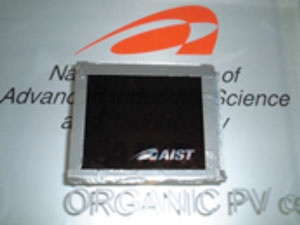Feb 16 2009
Kohjiro Hara and Nagatoshi Koumura, Research Scientists at AIST, have developed a high-performance dye-sensitized solar cell (DSSC) based on organic dye as part of the Grants-in-Aid Program for Scientific Research led by the New Energy and Industrial Development Organization (budget: about 5 billion yen).
 Organic-dye-sensitized solar cell prototype
Organic-dye-sensitized solar cell prototype
This technology may provide a solution to both the high manufacturing cost of the currently predominant silicon solar cell and the unstable supply of high-purity silicon. It is positioned as an innovative photovoltaic generation technology under the 2008 Technology Strategy Map by METI and is expected to be fully commercialized and significantly reduce the cost of producing solar cells.
Ruthenium complexes contained in conventional DSSCs are not used in the new solar cell, thus meeting the requirement for conserving this rare metal. In addition, the use of ionic liquid (IL)-based electrolyte in the cell has led to a good long-term stability of more than 2000 hours under AM 1.5 G irradiation (100 mW cm-2), compared with that less than 100 hours in DSSCs with volatile organic solvent based electrolytes.
Furthermore, this DSSC (a type of IL-based electrolyte) achieved a high solar-to-electricity conversion efficiency (cell efficiency) of 7.6% under AM 1.5 G irradiation, which is one of the highest performance among DSSCs with IL based electrolytes, and 5.5% efficiency with ionic gel-based electrolyte. It is expected that the cell will be commercialized as an innovative solar generation technology.